Read everything with a spiritual perspective Part 2
Reading life, life reading
Photo courtesy/Ma Ruixin
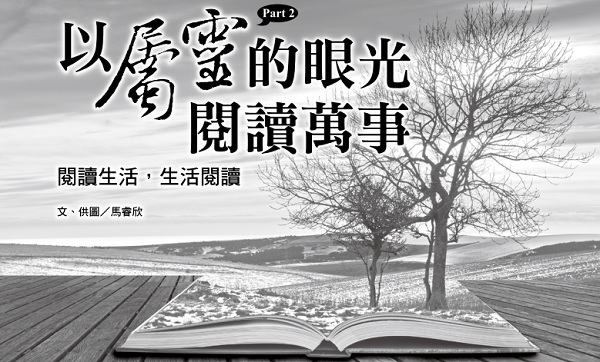
Preface: Continuing from the previous issue (Issue 41), Teacher Ma mentioned that reading life is a kind of experience, understanding and understanding of all things on earth, the universe, life, and reality through observation, listening, participation, and imagination. This article will continue to lead you and me into the new landscape of reading life from the perspective of "the approach to reading life". This article is published in three parts (Part 1), (Middle) and (Part 2).
Ways to read life
How to read life? Do you have any tips for life reading? Way?
1. Senses
Something very basic, and easily overlooked, is using your senses. Sight, smell, touch, and hearing are all masterpieces created by God, but we often “spare them sparingly.” What have you smelled in the past two days? What do those smells remind you of? In what circumstances have you ever smelled a similar smell? What was your mood or feeling at that time? What happened?
When you were riding or driving in a car today, what was the farthest thing you saw in the car? What have you touched this week that impressed you?
How many different sounds can you hear in church besides the sound of people talking and music?
The third child in our family has Asperger's Syndrome. Such children usually lack micro-expressions on their faces, which makes people think that they are either crying or laughing, or they are expressionless. He was particularly interested in a poker game called bragging. I'm glad he can play this game, because it's hard for Yasir to lie, not because they have high moral standards, but because if they believe something, it's hard to change. At first he kept losing, but then he started to cheat us. But after playing for a while, suddenly every time he cheated, I could catch him. She proudly told us that every time her brother played fake cards, his eyes would look up slightly. This is the power of observation. When everyone is paying attention to the cards in their hand and guessing how many cards are left, seeing a small movement makes a big difference.
Reading starts with vision. If you can’t see the words, it’s not about absorbing the content. Reading life also starts with the senses. If you don’t know how to use your senses, it’s hard to talk about what you can read from life. When the senses are deliberately used, they often bring surprises. Are you used to playing poetry and music during spiritual practice? Try playing no music at all, and let the sound of your family taking a shower and the sound of the garage next door serve as the background, and see what difference you experience.
Everyone has their own senses that they are good at using. Some people have good observation skills, some people have good hearing skills, and some people only feel things when they touch them. You might as well give yourself some challenges deliberately. For example, if you usually observe first when entering a situation, then next time you should deliberately listen first and smell first; when you get an apple and want to take a bite, you might as well first Smell that apple.
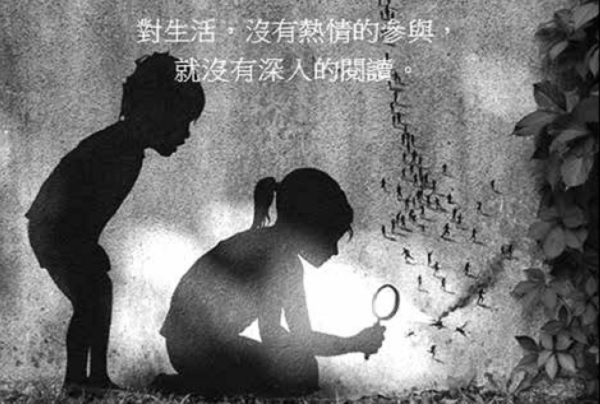
2. Creativity
Reading life requires not only knowing how to make good use of your senses, but also being creative. What is a creative reading life?
Take washing dishes, for example. Using my senses, I will feel the soft and slippery texture of soapy water, listen to the sounds I can hear when washing dishes, and smell the smell of the entire kitchen being empty except for myself. But when I use my creativity, I will imagine while washing: What would it be like if I were a maid washing the bowls used by the emperor? If what I was washing was not a bowl, but my own heart, how would I wash it?
After doing the most mundane and repetitive household chores for many years, I discovered that there are many similarities between tidying up a home and tidying up a person's heart. These inspirations do not come from a sudden inspiration, nor are they the content I outline with words when I pick up a pen to write; rather, in the reality of doing housework in daily life, in addition to serious participation and feelings, I often Ask yourself: How can you do something more creative besides finishing the things you have to repeat every day?
Knowing how to play games with yourself is a kind of creativity. For example, when you go to a restaurant to eat, you can open the menu and after ordering, you can think: Hmm! What name can we give this Mapo Tofu to be more attractive and highlight its characteristics? Have you ever counted how many smiling, angry or sad faces you see in a day?
A writer suggested that when you look at a painting, think about where in the painting you would start from if you were a painter; when picking up a book, don't rush to read it, think about it first If you were a writer writing about this topic, how would you write? What will be discussed?
When there is an opportunity for brain storming in life, throwing around ideas is the best way to practice creativity. Don't rush to think about the feasibility of this idea. In fact, many creative things seem impossible and ridiculous at first. I often say that ideas are free and it’s fun to talk about them; if you can’t talk about them, thinking about them is also a creative exercise.
When I read a love novel, I can think: If I were the heroine’s mother, how would I feel and interpret the heroine’s love? What if I were the heroine’s grandfather? When my son and I argue about something, I can also think: If I were Lao Li next door, what would I think when I heard the content of our quarrel? ─Usually a lot of arguments become unnecessary just by changing roles.
When creativity is added to life reading, the ordinary life you read will often change from two-dimensional to three-dimensional.
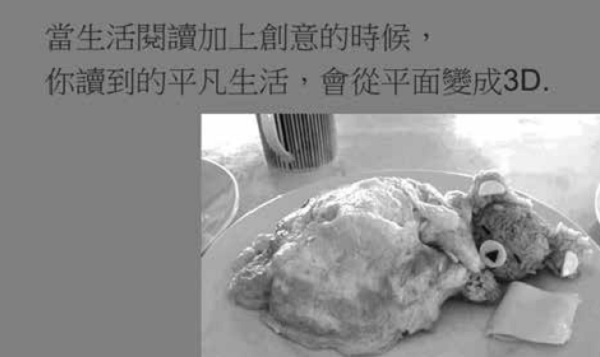
3. Participation
Li Xinpin, a very famous writer in Taiwan's advertising industry, once said that every time she travels, whether she is facing an extraordinary landscape or a six-star luxury hotel, she always tells herself: At this moment , I own these. So she unapologetically used and enjoyed that place, or that time.
Her words gave me a big reminder. I often live in a state of having something but not owning it: traveling to the snow with my family, wondering whether the children would have enough clothes and whether they had enough sleep last night; while eating, I would think about the Facebook team’s ideas; My son finally finished a painting and asked me to admire it, but I stared at his face and asked, "Did you not wipe your mouth after eating?"
Maybe your "disease" is not as serious as mine, but more or less, we all have the situation of standing on the stage, but being an outsider; what's even more sad is that we don't seem to be real until we recall it. Finally on the stage.
When you were listening to me talk about using the senses or creative connections earlier, you might not be able to help but ask: "How can I have so much time in the United States?"
Yes, reading is important, but people who read spiritual books all the time are often just weird uncles or weird mother-in-laws, not necessarily spiritual people. Reading in daily life takes time and effort, and it seems that it is not something that can be done at any time; but don’t be discouraged, just like reading a book, you will get different things from different levels of reading. If it is still difficult for you to live and read with your senses and creativity, I can also provide you with the most fundamental skill, which is participation.
Biographies are on my list of spiritual books every year. When I read biographies, I don’t set much preset goals—what I want to learn and what I want to know. When I read a biography, I accept the author's invitation to participate in a person's life, follow him (her) to his (her) birth environment and growth process, and participate in the great joys and sorrows of his (her) life. A lot of inspiration and understanding are always gained from this kind of participation process.
The same goes for reading in daily life. What you do and experience every day may not be the most interesting; but in the process of serious participation, you can also read some emotions and insights. Or, you may not feel moved or understand anything, but through participation, we are actually being affected and changed.
In daily life, we seem to be present; but many times, we are only physically present and do not actively participate. Do you know such people: they haven’t read too many books, and they can’t tell many truths, but they participate in real life seriously and can read some thought-provoking insights from life.
Lu Suwei, a well-known parent-child writer in Taiwan, did not learn to read until the fifth grade of elementary school. He attended special education classes in junior high school and took the college entrance examination five times. In the end, he graduated from the police college in third place and became a juvenile protection officer in the local court. Just as he was becoming more and more famous, his books were selling well, and people were rushing to invite him to give lectures, his illiterate father told him before he died: "A very bright place does not need an extra candle, but a dark place does not need an extra candle." , a candle is very important. We should remain a candle in a dark place all our life, and do not go to a bright place to shine."
This sentence deeply affected Lu Suwei, making him decide to choose an opposite corner to protect those who need a small candlelight when fame and fortune beckoned to him. This father's conclusion did not come from books, because he was illiterate, did not listen to lectures, and did not surf the Internet. This is his understanding from reading in ordinary life.
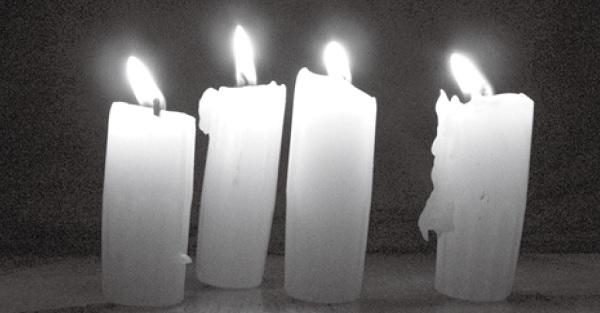
Regarding vacation, everyone may have experience: vacation may not be as beautiful as it seems on the outside. Although the place you go to is beautiful, it is easy for the family to be in close contact and misfire. The same is true for our family. Our two daughters came back from school and haven't seen each other for a while. We have to adapt to their changes - good and bad. One unhappiness or quarrel can make most of the vacation slip away. But during this vacation, I kept praying to God: I want to enjoy this vacation well and have close time with my family. Nothing else matters, including my own expectations for the vacation, and I must not interfere with it. So if the ladies are unhappy and don’t talk, I will enjoy the beautiful scenery; if my son is uncooperative and refuses to get out of the car when he arrives at the scenic spot, the two of us will act like fools and take pictures by ourselves in front of the mountains and rivers; and when they are willing, I won’t let them go. Take the opportunity to hug them hard and listen to them intently.
This is participation. Without enthusiastic participation in life, there will be no in-depth reading.
It is especially easy for Christians to "live in hope". When looking at the present, they often see problems and impossibilities, and then enter into waiting for hope in the future.
When I read spiritually about the conversation between Jesus and the Samaritan woman at the well, this extremely familiar story woke me up with a new point: in their conversation, the Samaritan woman kept saying In mentioning the future, there will be; and Jesus has been telling her: Now, in front of me, I am.
Life is a very good spiritual book given to us by God, but we often wait to sit down and make a cup of tea or coffee when we are free to read it.
We should not only try our best to participate in real life, but also constantly review and update the status of our participation.
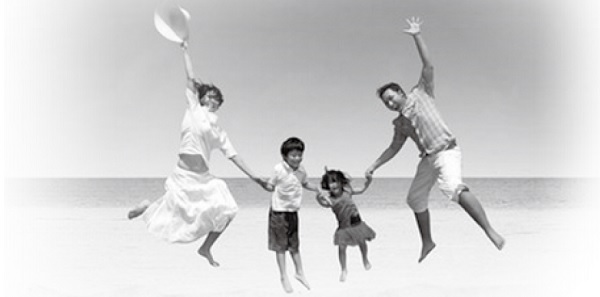
 Author profile
Author profile
Ma Ruixin is a writer. Her articles have been scattered in newspapers and magazines. She was a columnist for "Cosmic Light Magazine" and "True Love Family Magazine" and is currently the author of "Beijing Foundation Magazine". At the same time, I have been running an online blog for many years and have a Facebook page. He is the author of the books "The Footsteps of a Wanderer", "Managing the Family and Mind", and "The Wisdom of Discipline". "Private School Madam" blog, "Give me your sincerity" blog, "It's You" blog, and "Grab Happiness" Facebook page.
